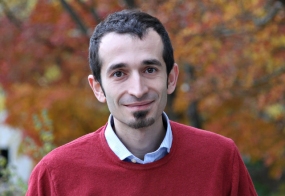Prestigious research prize for the discovery of new liver regeneration mechanisms
The Accademia Nazionale dei Lincei, Italy's national science academy, has awarded this year's Francesco De Luca Prize to Donato Inverso from the German Cancer Research Center (DKFZ) in recognition of his research achievements, which have permitted previously unimagined insights into how liver function is steered by blood vessels.
Blood vessels steer organ function. The endothelial cells in particular, which line the inside of the vessels, perform important steering and monitoring functions that have not previously been adequately understood. For the first time, the immunologist Donato Inverso and his colleagues managed to produce a high-resolution map of gene and protein expression in endothelial cells of the liver. His results allow a precise insight into the mechanisms of liver function and the steering of liver regeneration.
In addition, Donato Inverso was involved in the discovery that blood platelets that interact with liver and immune cells play a crucial role in the development of fatty liver, nonalcoholic fatty liver inflammation, and liver cancer.
Inverso obtained a doctorate from Vita-Salute San Raffaele University in Milan in 2015 and subsequently joined Hellmut Augustin's division at the German Cancer Research Center. The research results he obtained there have been published in the most prestigious journals.
The Accademia Nazionale dei Lincei, Italy's national science academy, was founded in 1603 and is regarded as one of the most reputed and oldest science institutions. One of its earliest members was Galileo Galilei. Over a period of four centuries, the academy has brought together Europe's most influential scientists, artists, and writers, including Werner Heisenberg, Theodor Mommsen, Wilhelm Röntgen, and Max Planck.
The international Francesco de Luca Prize is awarded to doctors in the field of cancer medicine and carries prize money of 10,000 euros.
With more than 3,000 employees, the German Cancer Research Center (Deutsches Krebsforschungszentrum, DKFZ) is Germany’s largest biomedical research institute. DKFZ scientists identify cancer risk factors, investigate how cancer progresses and develop new cancer prevention strategies. They are also developing new methods to diagnose tumors more precisely and treat cancer patients more successfully. The DKFZ's Cancer Information Service (KID) provides patients, interested citizens and experts with individual answers to questions relating to cancer.
To transfer promising approaches from cancer research to the clinic and thus improve the prognosis of cancer patients, the DKFZ cooperates with excellent research institutions and university hospitals throughout Germany:
The DKFZ is 90 percent financed by the Federal Ministry of Education and Research and 10 percent by the state of Baden-Württemberg. The DKFZ is a member of the Helmholtz Association of German Research Centers.


